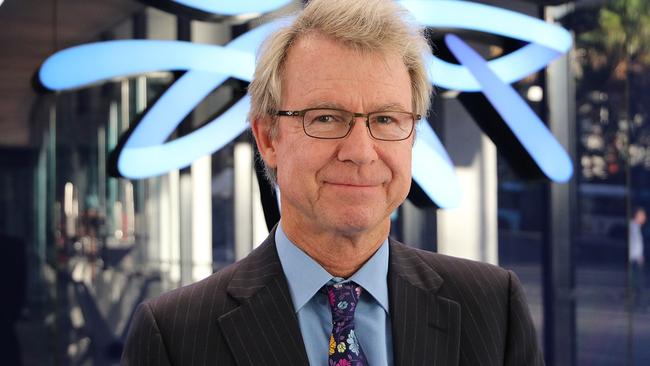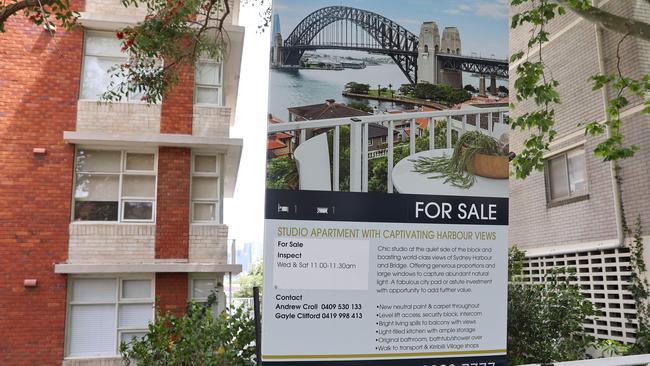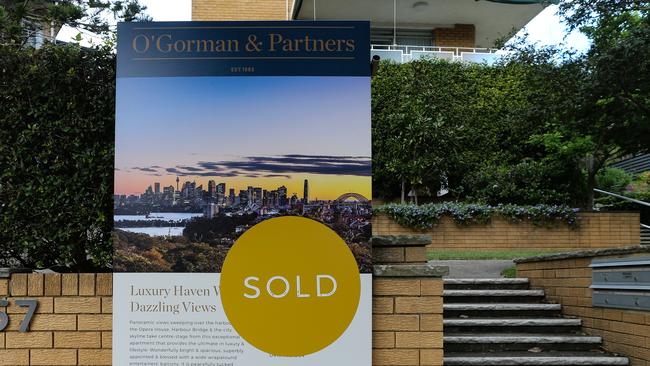Interest rate hikes could slash house prices by 15 per cent
There are warnings that the outlook for the property market is “dire”, with predictions the rate rise will spook buyers and see prices plunge.
Economy
Don't miss out on the headlines from Economy. Followed categories will be added to My News.
As interest rates were increased for the first time in more than 11 years this week, the move could trigger a sharp fall in house prices and see a much more cautious approach from Aussie homebuyers, experts have warned.
Economists have predicted house prices will take a hit, with Shane Oliver, chief economist at AMP Capital, forecasting that Sydney and Melbourne could experience the biggest shock with a drop of 15 per cent by the end of 2023 or early 2024.
The Reserve Bank of Australia (RBA), which set the official interest rate at 0.35 per cent on Tuesday, an increase of 0.25 per cent, has also predicted a drop of 15 per cent for house prices.
A 15 per cent fall would wipe out most of the 23.7 per cent increase that capital city property values saw through 2021.

Meanwhile Louis Christopher, founder of property data company SQM Research, has flagged a drop in property prices by 7 per cent in Sydney and 8 per cent in Melbourne as early as this year, although he said there are good chances of a speedy recovery if wage rises accelerate.
However, he said the initial reaction after Australia’s first interest rate rise in 11 years will be to immediately “spook” buyers, and he expects a sharp drop in the number looking to snap up a property.
Other experts are more conservative, with Andrew Wilson, chief economist at My Housing Market, predicting the two major cities will experience a decrease of just a couple of per cent this year.
“Melbourne and Sydney have consolidated those higher prices and there is no more capacity to grow at the spectacular rates of last year,” he told the Sydney Morning Herald.
The issue of buyer interest is a scenario being keenly felt in the construction sector as well.
Mark Bainey, chief executive of Sydney-based property developer Capio Property Group, said inquiries from buyers had “collapsed” and were down by a massive 50 per cent.
“Prices are remaining steady, but inquiries are always the best indicator of where prices are going. If inquiries are going down, then prices are going in the same direction. We’re prepared for it, but I think the outlook for the market is quite dire,” he told the Australian Financial Review.
He said the first rate hike was a signal about the new economic reality for homeowners, particularly for those who purchased in the past 12 months.

Less competition better for buyers?
Sydney-based buyers agent Jack Henderson said people were “scared” about buying a home which has created less competition, meaning he has been able to nab properties for 10 to 15 per cent cheaper for clients than six months ago.
Wendy Chamberlain, a Melbourne-based buyers agent, said housing prices are linked to consumer confidence with buyers’ budgets set to be slashed.
“As confidence leaves the market, so do buyers. What we are likely to see due to rising interest rates is a domino effect, but it may take two to four months to flow through to the market,” she told news.com.au.
“As interest rates rise, the ability of buyers to borrow as much money may drop. As the budget of a buyer drops, so will the demand for homes in that particular price bracket, as that buyer can now only afford a cheaper home.
“Add to this, buyers that are yet to buy and haven’t found a home may need to go back to their bank as their pre-approval expires. For some buyers, that bank will reassess their ability to service a loan.
“For some, with increased interest rates, the bank may not be willing to lend them the same amount – it may be less. So buyers will start to be priced out of the market if their borrowing capacity has reduced.”

All this means buyers will be shopping with reduced budgets, she said.
“This obviously then has a knock-on effect to house prices, as buyers can no longer spend the same amount to buy a house. House prices may therefore drop as a result,” she said.
“In the shorter term, over the next two months, buyers that are pre-approved would be wise to keep looking with the budget that they have today as their budget may be less tomorrow.”
She said it was the same for sellers, who should be putting their properties on the market now, while they still have buyers with today’s budget and not a reduced budget in three months’ time.
What the real estate agents are seeing
Ray White’s director of Sydney outlet in Woollahra and Paddington Clay Brodie said there was some hesitancy right now with rising rates “but quality properties in good areas are still selling well”.
There’s been a shift with many buyers definitely wary of overspending, Brisbane’s Ray White Beenleigh principal Glenn Hamilton said it has also spooked sellers with listings overall for the group down 9 per cent compared to the same time last year.
But Ray White chief economist Nerida Conisbee pointed out that fewer homes for sale could be actually be a bit of good news for house prices.
“It does mean that there are low levels of distress and it will prevent a large fall in house prices. But for buyers, it does mean it will be harder to take advantage of lower prices,” she said.
“When markets enter a new cycle, there is typically less new listings coming to market as sellers are more cautious. This lack of new stock on the market creates a challenge for buyers to find quality property.
“For these reasons, in a slow market, highly desirable properties are well sought after and will often defy expectations.”

But house price growth has already moderated noticeably in recent months, partly reflecting rising fixed mortgage rates, according to Peter Munckton, chief economist at the Bank of Queensland.
However, the rising number of homes for sale and affordability concerns have probably played a bigger role, he said.
Yet Canstar finance expert Steve Mickenbecker believes the changing conditions could actually be good news for first homebuyers.
“Rate increases will crystallise the expectation of significantly higher borrowing rates in the next couple of years and should hit property prices and slow the housing market,” he said. “This will at least relieve the desperation of first homebuyers trying to get into the market.”
Impact of major parties housing schemes
The Federal Government recently announced the price caps on the first homebuyer guarantee scheme would increase, along with the number of guarantees available.
The scheme allows first homebuyers to purchase a home with as little as a 5 per cent deposit, and the price cap on eligible homes has been raised to $900,000 in Sydney and $800,000 in Melbourne.
However, out of Finders RBA cash rate panellists, 70 per cent believe the increased caps would put upward pressure on property prices.

Two-thirds also warned that purchasing a home with a 5 per cent deposit is not a good idea.
Sarah Megginson, senior editor of money at Finder, said buyers should be cautious of these schemes.
“A 5 per cent deposit means you are paying interest on 95 per cent. Plus, any dips in the property market means that it is possible to fall into negative equity – as did many property buyers in Europe during the GFC,” she said.
However, Craig Emerson of Emerson Economics noted that the scheme was good for single mothers in particular, when secured by the National Housing Finance and Investment Corporation.
Labor Party leader Anthony Albanese has pledged a commonwealth equity contribution of up to 40 per cent of the purchase price of a new home, and up to 30 per cent for an existing home for eligible Australians on low and middle incomes.
Originally published as Interest rate hikes could slash house prices by 15 per cent





